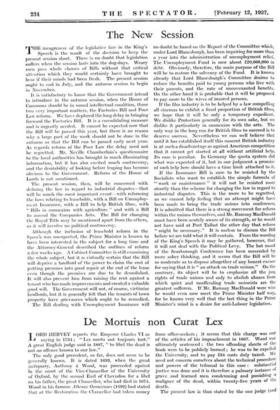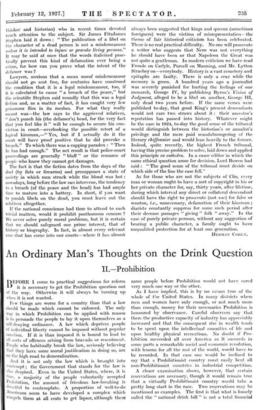De Mortuis non Curat Lex 1 -ORD HERVEY reports the Emperor
Charles VI as -4 saying in 1734 ; " Les morts ont toujours tort." A great English judge said in 1887, " to libel the dead is not an offence known to our law."
The only good precedent, so far, does not seem to be generally known. It is dated 1693, when the great antiquary, Anthony a Wood, was proceeded against in the court of the Vice-Chancellor of the University of Oxford, by the second Earl of Clarendon for a libel on his father, the great Chancellor, who had died in 1674. Wood in his famous Athenac Oxonienses (1692) had stated that at the Restoration the Chancellor had taken money from office-seekers ; it seems that this charge was one of the articles of his impeachment in 1667. Wood was ultimately sentenced : the two offending sheets of the book were to be publicly burned ; he was to be expelled the University, and to pay £34 costs duly taxed. We need not concern ourselves about the technical procedure and powers of the tribunal in this case : substantial justice was done and it is therefore a palmary instance of grave and learned men condemning and punishing a maligner of the dead, within twenty-five years of the death.
The present-law is thus stated by the one judge (and thinker and historian) who in recent times devoted much attention to the subject. Sir James FitzJames Stephen laid it down : " The publication of a libel on the character of a dead person is not a misdemeanour 'unless it is intended to injure or provoke living persons." It may be said at once that the words italicized prac- tically prevent this kind of defamation ever being a crime, for how can you prove what the intent of the defamer was ?- Lawyers, anxious that a mean moral misdemeanour should not go scot free, for centuries have construed the condition that it is a legal misdemeanour, too, if it is calculated to cause " a breach of the peace," but the scientific Stephen said roundly that this was a legal fiction and, as a matter of fact, it has caught very few poisonous flies in its meshes. For what they really meant was—the law says to the aggrieved relatives, " don't punch his (the defamer's) head, for the very fact that you feel like it " will be enough to secure his con- viction in court—overlooking the possible retort of a logical kinsman,—" Yes, but if I actually do it the court will have proof positive that he did provoke a breach." To which there was a capping paradox : " Then he has had enough." The net result is that police-court proceedings are generally " bluff " or the resource of people who know they cannot get damages.
The fact is that the fiction dates from the days of the duel (by fists or firearms) and presupposes a state of society in which men struck while the blood was hot : nowadays, long before the law can intervene, the tendency to a breach (of the peace and the head) has had ample time to mature into a battery. In short, if you want to punish libels on the dead, you must leave out the relatives altogether.
If the national conscience had time to attend to such trivial matters, would it prohibit posthumous censure ? We never solve purely moral problems, but it is certain that we should safeguard one prime interest, that of history or biography. In fact, in almost every relevant case that has come into our courts—where it has almost always been suggested that kings and queens (sometimes foreigners) were the victims of misrepresentation—the theme of fair historical criticism has been celebrated. There is no real practical difficulty. No one will prosecute a writer who suggests that Nero was not everything he should have been or that Napoleon the Great was not quite a gentleman. In modern criticism we have read Froude on Carlyle, Purcell on Manning, and Mr. Lytton Strachey on—everybody. History is a vast cemetery and epitaphs are faulty. There is only a crux while the memory is green. A hundred years ago a journalist was severely punished for hurting the feelings of one monarch, George IV, by publishing Byron's Vision of Judgment, alleged to be a libel on another, George III, only dead two years before. If the same verses were published to-day, that good King's present descendants would not care two straws about it : their ancestor's reputation has passed into history. Whatever might be the case in 1824, to-day the good sense of the tribunal would distinguish between the historian's or annalist's privilege and the mere paid scandalmongering of the literary chiffonnier and would lean heavily to the former. Indeed, quite recently, the highest French tribunal, having this precise problem to solve, laid down and applied this principle ex cathedra. In a cause celebre in which the same ethical question arose for decision, Lord Bowen had said : " The good sense of the tribunal must decide on which side of the line the case fell."
As for those who are not the subjects of Clio, every man or woman ought to have a sort of copyright in his or her private character for, say, thirty years, after lifetime, during which interval any direct or collateral descendant should have the right to prosecute (not sue) for false or wanton, i.e., unnecessary, defamation of their kinsman ; diarists constantly suppress for some such period after their decease passages " giving " folk " away." In the case of purely private persons, without any suggestion of bearing a public character, a family ought to have unqualified protection for at least one generation.
HERMAN COHEN.











































 Previous page
Previous page